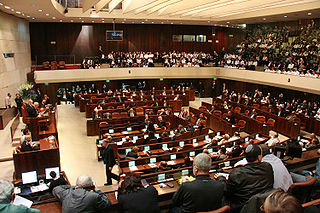Guest Columns
Statesmanship

Statesmanship obviously requires (1) well-educated statesmen, but also (2) a literate people disposed to moderation, and (3) well-designed elections rules which determine who rules. It will be obvious that of these prerequisites the easiest to change are election rules.
Changing election rules: difficult, but necessary
Not that election rules are easy to change, for the election rules existing in any country favor entrenched interests. Nevertheless, changing the election rules can change the distribution of power and therefore the policies, character, and goals of a country. (It has been said that a low electoral threshold, which produced a profusion of parties, led to a widespread yearning for a single strong leader, which helped Hitler’s ascendancy in Weimar Germany.)
In Israel, the pluralism generated by its parliamentary election rules has fragmented the cabinet and rendered the Government incapable of pursuing a coherent and resolute national strategy essential for the country’s survival.
Anyone who has studied James Madison and Alexander Hamilton in The Federalist Papers will understand that political institutions in general, and election rules in particular, can be designed in such a way as to increase the probability of
- advancing higher quality men to public office,
- elevating debate in the Legislature,
- improving decision-making in the Executive,
- minimizing corruption in the bureaucracy, and, at the very least,
- preventing majority as well as minority tyranny.
Choices of election rules
There are two extreme types of parliamentary election rules. One maximizes the power of the party leaders, the other the power or freedom of choice of the voters. Israel and Israel alone represents the first extreme where the voter must cast his ballot for a fixed or party-ranked list of candidates in a single countrywide district election.
The other extreme employs multi-district elections and the voter is given the option of voting either for a party list or for a designated number of candidates running in his district without regard for their party affiliation. In fact, the voter can mix his preferred candidates from one party with those from other parties. In this way, each voter has a say in the district’s whole legislative contingent!
Between these two extremes are many electoral systems which more or less balance the power of the parties and the freedom of choice of the voters. Essential for any reasonable balance, however, is constituency or multi-district elections.
Personalized voting?
Some countries use what is called “personalized” proportional representation. For example, in Germany the voter is given two votes, one for an individual candidate and one for a party list. The candidate vote is for a single-member district contest that is won by a plurality, as in the United States and in some 24 other countries. The second vote, however, is for a party list, and is used to provide compensatory seats to those parties which did not receive in the single-member districts the seat share proportional to their nationwide vote share. (Actually, much the same result can be achieved with a single vote, as in Denmark and Sweden.) Alternatively, many political scientists recommend the preferential voting system used in Australia and Ireland, where citizens rank the candidates on the party lists.
(Of the parliamentary electoral systems I have examined, from Argentina to Zambia—and almost all have written constitutions—any one of them is preferable to that used in Israel! All render legislators more accountable to the people and more subject to the rule of law. All of these gentile electoral systems are therefore more consistent with the Torah than that which operates in the so-called Jewish State of Israel!)
Election rules in Jewish law
Recall the verse in Deuteronomy where the Israelites were told to select wise and understanding men “known to their tribes.” Rabbi Samson Raphael Hirsch comments that each tribe (shevet) is to choose out of its own midst men whose “character can only be known … to those who have associated with them.” What is here called a shevet was called a district after the Second Temple. Hence it is fair to say that multi-district elections, where a representative has to be a resident of his district, is a Jewish principle of governance. In contrast, Israel’s present system of parliamentary representation is not only not Jewish, it is only superficially democratic. Indeed, the absence of constituency elections leads to contempt for the people on the part of Israel’s ruling elites.
Contrast the Republic of Ireland. Like other democracies, Ireland’s Constitution prescribes a system of preferential voting for its House of Representatives, a system that heightens the electoral latitude and power of the people. Consistent with respect for the people, Article 27 of the Constitution declares: “A majority of the members of the Senate and not less than one-third of the Members of the House of Representatives may, by joint petition addressed to the President … request the President to decline to sign and promulgate as a law any Bill to which this article applies on the ground that the Bill contains a proposal of such national importance that the will of the people thereto ought to be ascertained.”
Constituency elections as a requirement of Jewish law
Translated into contemporary language, the Jewish laws I have cited mandate constituency elections for the Knesset. In such elections candidates for office will have to argue the merits of their policies before their constituents, and will therefore have to be sensitive to the abiding beliefs and values of their constituents as well as to their present concerns and interests. Given constituency elections, an MK, in deliberating over proposed government policies—and now without fear of being sacked by his party—will be able to make a balanced judgment between the interests of his constituents, his party’s agenda, and his own conscience. More independent and self-respecting people will be attracted to the Knesset, and the Knesset, for the first time, will be able to fulfill the crucial function of administrative oversight precluded by Israel’s existing parliamentary electoral rules.
Adapting these rules to Jewish law would not only facilitate Jewish statesmanship; it would render Israel a high-toned democracy.☼
-

 Civilization3 days ago
Civilization3 days agoThe Theory and Practice of Sanctuary Cities and States
-

 Civilization4 days ago
Civilization4 days agoThe Duke and the Dork
-

 Civilization3 days ago
Civilization3 days agoAmerica Can’t Secure Its Future on Imported Minerals
-

 Executive4 days ago
Executive4 days agoExclusive: Trump OMB Launches Full Review of Federal Funds Sent to Blue States
-

 Civilization4 days ago
Civilization4 days agoTrump Admits Nobel Peace Prize Wouldn’t Improve US Lives
-

 Civilization3 days ago
Civilization3 days agoCompetition Coming for the SAT, ACT, AP, and International Baccalaureate
-

 Civilization24 hours ago
Civilization24 hours agoSupreme Court Orders CA Dems To Justify Prop 50 Maps
-

 Civilization18 hours ago
Civilization18 hours agoThe Minnesota Insurrection














[…] countries, and in the State of Israel. (And past contributors to CNAV, residents of Israel, have railed against such proportional representation and argued for single-member district. […]